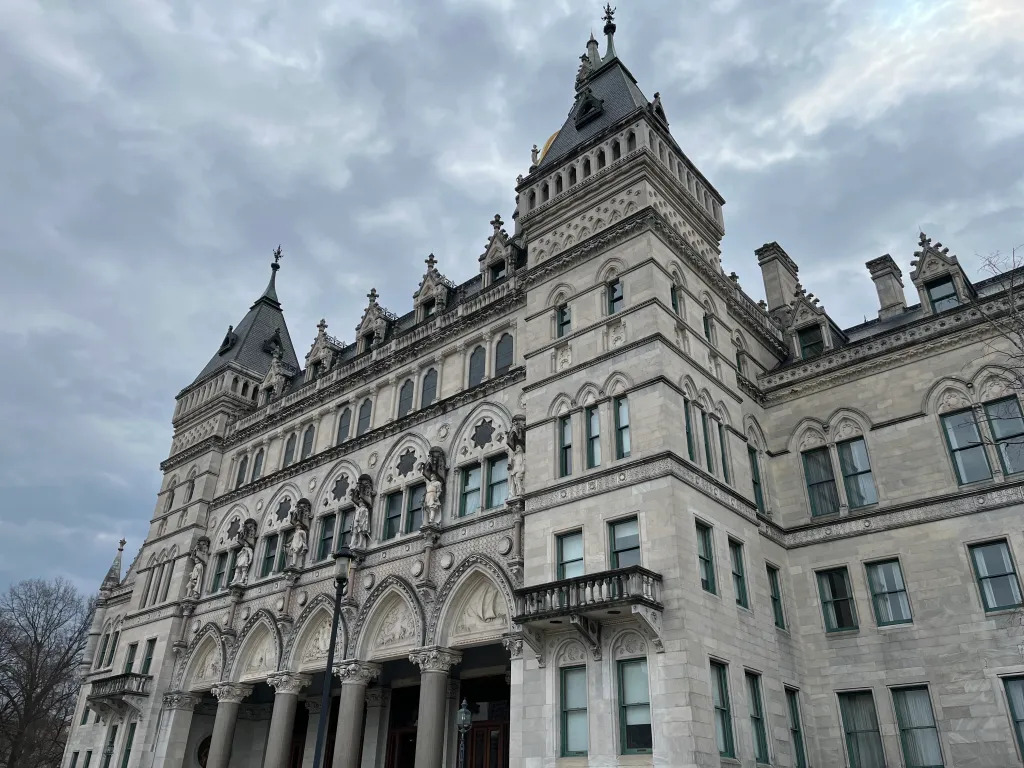Copyright Hartford Courant

In early 2022, a state lawmaker wanted to launch a program to train minority contractors to install heating and cooling systems for schools — and he made it clear who he thought should be involved. Doug McCrory, a Democratic state senator from Hartford, called several meetings with the leaders of three Connecticut state agencies to discuss the details, according to emails obtained by The Connecticut Mirror. He also invited Jennifer Little-Greer, the director of the Minority Construction Council, and Sonserae Cicero, a nonprofit director who, along with McCrory, is now under federal investigation. The state legislature then committed $300,000 in COVID relief funds for an “HVAC training agency” in May 2022 — at McCrory’s behest, one top state official said. That money was never spent and was eventually returned to the legislature. But McCrory’s orchestration of the plan — and Cicero’s involvement in the discussions — fit a pattern. Since 2020, records show, McCrory pushed for Cicero and her companies to receive several state grants for education initiatives, economic development programs and other projects. Not all of those efforts paid off, but in the span of a several years, Cicero’s businesses went from unknown entities to organizations that netted millions of dollars in taxpayer money. It’s not uncommon for state lawmakers to assist their constituents or to direct them to state agencies for help. But McCrory’s work on Cicero’s behalf could be problematic if the two were in a personal relationship, as federal investigators are looking into. Cicero did not respond to text messages or emails for this story. McCrory, who has served in the legislature for two decades, also did not answer questions that the CT Mirror sent to him over the course of several days. McCrory answered a phone call from the CT Mirror on Thursday, but the state legislator said he was too busy to answer questions about the meetings he arranged between Cicero and the commissioners in 2022. At a Friday press conference, McCrory declined to discuss his role in the process. “I’m not responding at this time to any questions that any reporters have about anything that’s going on with the situation, the federal investigation,” he said. Gov. Ned Lamont’s policy director at the time, Jonathan Dach, was included on emails regarding the meetings among his cabinet members and McCrory, but a spokesperson for the governor declined to comment for this story. When Lamont was asked at a press conference on Wednesday about the federal corruption probe targeting McCrory, he said people should let the investigation play out. “I think this thing is under investigation,” said Lamont, a Democrat who was preparing to announce a campaign for a third term as governor. “Let’s see how things sort out over the course of the next few months.” The emails from early 2022 show McCrory repeatedly contacted the commissioners of the state Department of Labor and Department of Administrative Services, as well as the state Office of Workforce Strategy, asking them to work with Cicero and the Minority Construction Council on the HVAC program. “I’m respectfully requesting another meeting, as soon as possible, to discuss the direction of the program as a follow to the last meeting you held with SHEBA Consulting and Minority Construction Council,” McCrory wrote to the commissioners in April 2022. “It is imperative that we address the effectiveness of our current apprentice programs as it relates to racial equity and diversity.” The emails also show that McCrory wanted to be included in all of the discussions between Cicero, Little-Greer and the state agencies. Emails show that Michelle Gilman, the commissioner of the Department of Administrative Services, facilitated those meetings. Gilman told the other commissioners that the HVAC training program was a “priority” for McCrory, who has served as the chairman of the legislature’s education committee for several years. At that time, McCrory was also negotiating with Lamont’s administration over whether the state should spend hundreds of millions of dollars upgrading the HVAC systems in Connecticut schools following the COVID-19 pandemic. Gilman, who oversees the state’s school construction grant program, explained that McCrory wanted to create some type of pilot program to make sure minority contractors were capable of securing some of that future work. And that is where SHEBA and the Minority Construction Council would come into play, Gilman explained. “What I’d like to ask for is your help in discussing options for a pipeline program pilot or connecting the Minority Contracting Council and SHEBA to the trades/education sector to discuss workforce training and growth,” Gilman wrote to the other agency heads in early April, 2022. The CT Mirror contacted Little-Greer, the head of the Minority Construction Council, last week to ask how she became involved in the discussions about the HVAC training program with McCrory and Cicero. “I wanted to discuss a program. They’re not discussing,” Little-Greer said, referring to Cicero and McCrory. “We’re the Minority Construction Council. It was a program I wanted to get implemented, and I still want to get it implemented.” Little-Greer then refused to answer further questions about why Cicero was looped into the meetings, and she asked whether the CT Mirror reporter had money for her to start the HVAC training program. “Do you have money that I could implement it?” she asked before ending the phone call. Danté Bartolomeo, the state’s labor commissioner, participated in at least one of the follow-up meetings with Cicero and Little-Greer, but she later explained to McCrory that her agency, while involved in apprenticeship programs, did not directly run them. “Please remember that CTDOL does not place apprentices in (registered apprenticeship programs), nor do we hire instructors,” Bartolomeo wrote. In a separate email, Bartolomeo told Gilman that she and Todd Berch, the state’s apprenticeship director, had numerous connections in the construction trades. But she said she had never heard of SHEBA or the Minority Construction Council. “I don’t know Jennifer Little-Green (MCC ED) and Sonserae Cicero (SHEBA CEO),” she wrote. The emails show Kelli-Marie Vallieres, the state’s Chief Workforce Officer, was more amenable to the proposal that McCrory was putting forward. Vallieres told her staff she was frustrated that she wasn’t more informed about the proposed training program during the first meeting with McCrory in March. The Office of Workforce Strategy was a relatively new agency at the time. It was only officially recognized by the legislature the previous year. And Vallieres and her staff said they were eager to become “the go-to agency for workforce development.” As a result, Vallieres told Gilman that OWS might be able to create a “pre-apprenticeship program.” And she said that “could attract workers into this field with a ladder to a full apprenticeship.” But Vallieres’ staff expressed concerns, as well. Niall Dammando, her chief of staff, noted that the office might want to avoid anything to do with the state’s school construction program, which at the time was the subject of another federal criminal investigation. “This might be an area that we want to stay away from. School construction is super politicized,” Dammando wrote, adding that he would reach out to Lamont’s office for advice. It’s unknown whether Lamont’s office provided guidance to the staff at OWS and the other agencies. But the emails show that Vallieres continued to schedule meetings with Cicero and Little-Greer as the legislative session wound down. Before one of those meetings, Vallieres was informed that Cicero’s company was also partnering on another state grant application for $5 million. And they debated whether she should continue to hold meetings with Cicero on the HVAC program. Vallieres decided to keep the lines of communication open, however. “Let’s keep this meeting,” she told her staff. “It is focused specifically on a request from Sen McCrory on attracting more minorities to HVAC careers.” Vallieres told the CT Mirror that McCrory was responsible for directing the $300,000 that eventually was sent to her office. But she said the federal funds were never spent because McCrory didn’t explain his intentions for the money and because her small staff didn’t have the capacity to run another program at the time. CT Mirror reporter John Moritz contributed to this story. Moritz, Andrew Brown and Dave Altimari are are reporters for The Connecticut Mirror (https://ctmirror.org/ ). Copyright 2025 © The Connecticut Mirror.



